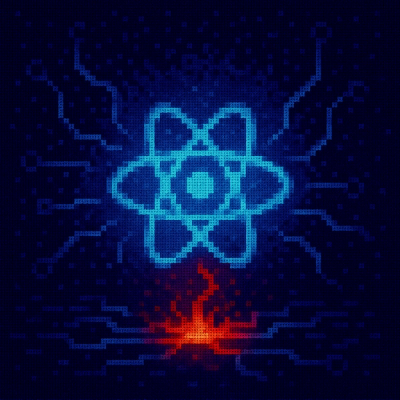
Security News
November CVEs Fell 25% YoY, Driven by Slowdowns at Major CNAs
November CVE publications fell 25% YoY even as 2025 totals rose, showing how a few major CNAs can swing “global” counts and skew perceived risk.
noise-protocol
Advanced tools
noise-protocolJavascript implementation of the Noise Protocol Framework based on libsodium
:rotating_light: :warning: :rotating_light: BETA :rotating_light: :warning: :rotating_light:
Note that this implementation is low level and requires knowledge of the Noise Protocol Framework, and is aimed to be a building block for higher-level modules wishing to implement application-specific handshakes securely.
var noise = require('noise-protocol')
var sClient = noise.keygen()
var sServer = noise.keygen()
// Initialize a Noise_KK_25519_XChaChaPoly_BLAKE2b handshake
var client = noise.initialize('KK', true, Buffer.alloc(0), sClient, null, sServer.publicKey)
var server = noise.initialize('KK', false, Buffer.alloc(0), sServer, null, sClient.publicKey)
var clientTx = Buffer.alloc(128)
var serverTx = Buffer.alloc(128)
var clientRx = Buffer.alloc(128)
var serverRx = Buffer.alloc(128)
// -> e, es, ss
noise.writeMessage(client, Buffer.alloc(0), clientTx)
noise.readMessage(server, clientTx.subarray(0, noise.writeMessage.bytes), serverRx)
// <- e, ee, se
var serverSplit = noise.writeMessage(server, Buffer.alloc(0), serverTx)
var clientSplit = noise.readMessage(client, serverTx.subarray(0, noise.writeMessage.bytes), clientRx)
// Safely dispose of finished HandshakeStates
noise.destroy(client)
noise.destroy(server)
// Can now do transport encryption with splits
console.log(serverSplit)
console.log(clientSplit)
noise.PKLEN length of a public key in bytesnoise.SKLEN length of a secret key in bytesAll one-way and fundamental handshake patterns are currently supported:
NKXNNKNNKKKNXKXXNINXKIKXXIXvar handshakeState = noise.initialize(handshakePattern, initiator, prologue, [staticKeys], [ephemeralKeys], [remoteStaticKey], [remoteEphemeralKey])Create a new Noise handshake instance with:
handshakePattern must be String and one of supported patternsinitiator must be Booleanprologue must be Buffer. This can be an empty Buffer (Buffer.alloc(0)) if
not usedstaticKeys is local static keys as an object of {publicKey, secretKey}.
This is only required if the handshake pattern mandates these as shared out of band (premessages)ephemeralKeys is local ephemeral keys as an object of {publicKey, secretKey}.
This is only required if the handshake pattern mandates these as shared out of band (premessages)remoteStaticKey is a Buffer of PKLEN bytes. This is most likely not requiredremoteEphemeralKey is a Buffer of PKLEN bytes. This is most likely not required:alert: Key material passed in is copied into libsodium Secure Buffers, which
can be cleared with noise.destroy(state). Be aware that you manually have to
destroy this state object, unless you want to rely on GC clearing it for you.
Returns a HandshakeState object, which should be treated as an opaque object.
This state is passed as the first argument to subsequent noise functions.
var maybeSplit = noise.writeMessage(state, payload, messageBuffer)Process a new message pattern and write any output to be transmitted to the
receiving party into messageBuffer. Any payload data can be passed as
payload, or the empty Buffer in case of no payload.
state must be a HandshakeState as returned by noise.initializepayload must be Buffer. Use the empty Buffer (Buffer.alloc(0)) in case of
no payload. Whether it is safe to send a payload at a specific step of the
handshake is at the discretion of the user. Please refer to Noise - 7.3. Handshake pattern validitymessageBuffer must be Buffer. In the worst case it requires
PKLEN + PKLEN + MACLEN (32 + 32 + 16) bytes, for a two keys and a MAC,
plus any bytes required for payload.byteLength + MACLEN (MACLEN = 16)If no more message patterns are left to process, a Split will occur. Please see below for details. If more patterns are pending, nothing is returned.
The function may throw an error if:
HandshakeState is invalid for the current message patternmessageBuffer is too small to contain the required dataIn any of these cases there was a misuse and the HandshakeState should be
noise.destroyed and connection aborted.
noise.writeMessage.bytesThis property is set after noise.writeMessage has been successfully executed
and signals how many bytes were written to messageBuffer
var maybeSplit = noise.readMessage(state, message, payloadBuffer)Process a new message pattern and read any input received from message.
Any remaining data in message is treated as payload data and will be decrypted
(depending on the HandshakeState) and written to payloadBuffer.
state must be a HandshakeState as returned by noise.initializemessage must be a Buffer, as produced by noise.writeMessage. Any framing
or length information is left to the application as described in the Noise
Specification.payloadBuffer must be Buffer. Use the empty Buffer (Buffer.alloc(0)) if no
payload is expected, though this may throw an error if a payload is attempted
writtenIf no more message patterns are left to process, a Split will occur. Please see below for details. If more patterns are pending, nothing is returned.
The function may throw an error if:
HandshakeState is invalid for the current message patternpayloadBuffer is too small for the required dataIn any of these cases there was a misuse and the HandshakeState should be
noise.destroyed and connection aborted.
noise.readMessage.bytesThis property is set after noise.readMessage has been successfully executed
and signals how many bytes were written to payloadBuffer
noise.destroy(state)Takes a HandshakeState and destroys all internal data (eg. securely zeros out
data contained in Buffer-like objects and resets state). Use this to dispose of
state objects after a split has occurred or upon error
If no more message patterns are left to process, a Split will occur, as
described in the Noise Specification. In this implementation an object with
{tx: Buffer, rx: Buffer} will be returned, each being a
sodium-native Secure Buffer
containing a cipher state as a contiguous piece of memory. It is encoded as
32 byte k | 8 byte n, as describe in the Noise Specification. You can either
choose to use these Buffers with the cipherState
functions or extract values and use with another transport encryption, as long
as you are aware of the security implication of either choise. For initiator and
responder, tx and rx are opposite so a responders rx is equal to an
initiators tx.
npm install noise-protocol
libsodiums crypto_kx_* API which hashes the shared secret with the
client and server public key; BLAKE2b-512(shared || client_pk || server_pk)crypto_aead_xchacha20poly1305_ietf_* for symmetric cryptography with
nonces 128-bit zero || 64-bit counter, meaning the protocol name is Noise_*_25519_XChaChaPoly_BLAKE2b, with * being the handshake patternfn(state, output, args...) conventionMACLENFAQs
Javascript implementation of the Noise Protocol Framework based on libsodium
The npm package noise-protocol receives a total of 418 weekly downloads. As such, noise-protocol popularity was classified as not popular.
We found that noise-protocol demonstrated a not healthy version release cadence and project activity because the last version was released a year ago. It has 1 open source maintainer collaborating on the project.
Did you know?

Socket for GitHub automatically highlights issues in each pull request and monitors the health of all your open source dependencies. Discover the contents of your packages and block harmful activity before you install or update your dependencies.

Security News
November CVE publications fell 25% YoY even as 2025 totals rose, showing how a few major CNAs can swing “global” counts and skew perceived risk.

Security News
React disclosed a CVSS 10.0 RCE in React Server Components and is advising users to upgrade affected packages and frameworks to patched versions now.

Research
/Security News
We spotted a wave of auto-generated “elf-*” npm packages published every two minutes from new accounts, with simple malware variants and early takedowns underway.